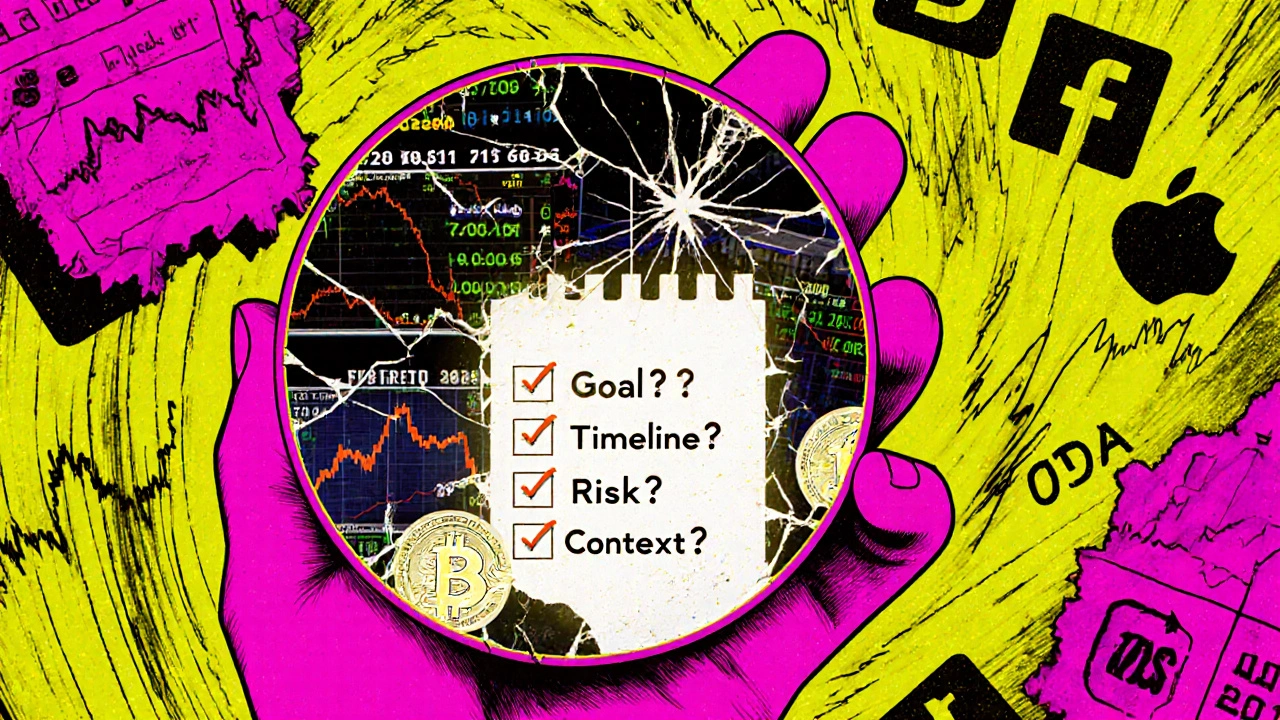Personal Investment Benchmark Calculator
Create Your Personal Benchmark
It’s tempting to look at your neighbor’s stock portfolio and wonder why yours isn’t growing as fast. Maybe they’re up 25% this year while you’re only at 8%. You start questioning your strategy. Maybe you should be buying the same hot stocks. Maybe you’re doing it all wrong. But here’s the truth: comparing your returns to others is one of the most dangerous habits in investing-and it’s not because you’re lazy or uneducated. It’s because you’re benchmarking against the wrong goals.
Why Your Neighbor’s Returns Don’t Matter
Let’s say your neighbor bought Bitcoin in 2020 and doubled his money in a year. He’s now bragging about his 100% annual return. You feel behind. So you start chasing crypto, risking money you can’t afford to lose. Six months later, you’ve lost 40% and are stuck holding a coin you don’t understand. This isn’t a rare mistake. It’s the default setting for most investors. We’re wired to compare. Social media, financial news, and even casual conversations at the gym make it easy to measure yourself against others. But here’s the problem: your neighbor’s portfolio isn’t your portfolio. He’s 35, single, with no debt, and works in tech. You’re 52, married, with two kids, a mortgage, and a 401(k) you need to protect. Your goals, risk tolerance, and time horizon are completely different. Benchmarking your returns against someone else’s is like comparing your marathon time to a sprinter’s. You’re not running the same race. And yet, most investors do exactly that-without even realizing it.The Hidden Cost of Wrong Benchmarks
In business, companies lose billions every year by benchmarking against the wrong competitors. Xerox saved $1.5 billion in the 1980s by benchmarking the right things. But when they tried to copy Apple’s product design without understanding their own manufacturing strengths, they wasted millions. The same thing happens in investing. A 2023 study by Deloitte found that 47% of companies that benchmark ROI against industry averages make worse investment decisions because they ignore their unique capital structure. In investing, that translates to: you’re not just copying someone else’s stock picks-you’re copying their financial situation, risk appetite, and time frame. And that’s dangerous. Here’s a real example: a client of mine in Missoula was comparing his retirement portfolio to a friend who was investing in speculative tech startups. His friend was 28, had no dependents, and could afford to lose everything. My client was 60, retired, and needed steady income. He started selling his dividend stocks to buy crypto. Within a year, his portfolio dropped 30%. He didn’t lose money because the market crashed-he lost it because he chased a benchmark that had nothing to do with his goals.What Are the Right Benchmarks?
The right benchmark isn’t your neighbor, your cousin, or even the S&P 500. It’s your own plan. If your goal is to retire at 65 with $1.2 million, then your benchmark is whether you’re on track to hit that number. Not whether you’re outperforming the market. Not whether your returns are higher than your coworker’s. Just: are you moving closer to your goal? Here’s how to build your own benchmark:- Define your financial goal: retirement, buying a house, funding education?
- Set a timeline: 5 years? 15 years? 30 years?
- Calculate how much you need to save and grow each year to reach it.
- Use a simple metric: your portfolio’s annual growth rate compared to your required rate.

The Three-Point Relevance Filter
Before you compare your returns to anyone else’s, ask yourself these three questions:- Is this benchmark aligned with my goals? If your goal is capital preservation, don’t benchmark against someone who’s gambling on meme stocks.
- Is this benchmark feasible for me? Can you realistically replicate their strategy? Do you have the same access to capital, time, or information?
- Does this benchmark match my context? Are they in the same life stage? Same country? Same tax bracket? Same risk tolerance?
What Happens When You Ignore This?
The consequences aren’t theoretical. They’re financial, emotional, and long-lasting. - You take on too much risk trying to match someone else’s returns. That leads to panic selling during downturns. - You ignore your own strengths. Maybe you’re great at long-term investing, but you start trading daily because your friend is day-trading. - You feel constant anxiety. Every market swing feels like a personal failure. - You make decisions based on FOMO, not logic. That’s how people buy high and sell low. A 2022 survey of mid-sized investors found that 58% had made at least one major investment mistake in the past three years because they benchmarked against the wrong goals. The average loss? $180,000. And the worst part? It takes years to recover. One investor I spoke to spent 14 months trying to “catch up” after chasing crypto. He didn’t just lose money-he lost confidence. He didn’t invest again for two years.
How to Break the Habit
Changing how you think about returns takes practice. Here’s how:- Write down your investment goals. Put them on your fridge. Review them every quarter.
- Block social media accounts that post “I made 500% this year!” memes. They’re not helping you.
- Use a personal performance tracker. Not a stock app. A simple spreadsheet: your starting balance, contributions, ending balance, and growth rate.
- Ask yourself: “Is this decision helping me reach my goal-or just making me feel better than someone else?”
- Find one trusted advisor or mentor who understands your situation-not someone who’s “killing it” on YouTube.
Stop Measuring. Start Planning.
Investing isn’t a competition. It’s a personal journey. Your returns aren’t a scorecard-they’re a tool. A way to see if you’re moving in the right direction. The market doesn’t care if you’re ahead of your neighbor. It only cares if you’re on track to meet your own goals. So next time you feel tempted to compare your returns to someone else’s, pause. Ask: Is this benchmark helping me, or hurting me? If the answer isn’t clear, walk away. Your portfolio will thank you.Why is comparing my investment returns to others a bad idea?
Comparing your returns to others ignores your unique financial situation-your goals, risk tolerance, time horizon, and life stage. Someone else’s portfolio might be built for aggressive growth, while yours needs stability. Chasing their returns can lead to risky decisions, emotional stress, and losses that have nothing to do with the market.
What should I use as a benchmark instead?
Use your own financial plan. Your benchmark should be whether you’re on track to meet your personal goal-like retiring with $1 million or funding your child’s education. Track your portfolio’s growth rate against the target you calculated based on your timeline and savings rate. The S&P 500 is only relevant if your goal is to match the market.
Can I ever use the S&P 500 as a benchmark?
Yes-but only if your goal is to match the overall market’s performance. If you’re building a conservative income portfolio with bonds and dividend stocks, the S&P 500 isn’t your benchmark. It’s like using a sports car’s top speed to judge a delivery van’s efficiency.
How do I know if I’m benchmarking against the wrong thing?
Ask: Does this benchmark align with my goals? Is it feasible for me to achieve? And does it match my context-like my age, income, debt, and risk tolerance? If any answer is no, it’s the wrong benchmark. Most investors fail because they ignore the third question.
What are the most common mistakes investors make when benchmarking?
The top three are: comparing to people with different risk profiles, chasing short-term gains instead of long-term goals, and using metrics that don’t reflect their actual strategy-like measuring total returns when they need steady income. Many also compare to industry averages without adjusting for their portfolio’s asset mix.
How can I stop feeling anxious when others seem to be doing better?
Focus on progress, not comparison. Track your own milestones: Did you increase your savings rate? Did you reduce fees? Did you stick to your plan during a market drop? These are real wins. Also, limit exposure to social media and financial influencers who glorify risky bets. Your journey is yours alone.






Comments
I used to scroll through Reddit threads where people bragged about their crypto gains and feel like a failure. Then I realized I wasn’t trying to get rich quick-I was trying to retire without selling my organs. My benchmark isn’t some 28-year-old tech bro with a hedge fund. It’s whether I’m hitting my 5% annual growth target to fund my kid’s college fund. Last year I hit 5.3%. That’s my win. No one else’s numbers matter.
YASSS. This is the exact vibe I’ve been trying to scream into the void for years. Stop comparing your bond-heavy, dividend-yielding, inflation-hedged portfolio to some guy who bought Dogecoin because he saw it on TikTok. You’re not behind-you’re *strategic*. The S&P 500 is a reference point, not a finish line. If your goal is steady income at 65, your real KPI is ‘Did I sleep well this quarter?’ Not ‘Did I outperform the market?’ I track my progress in a Google Sheet with emojis. 📈✅😴 That’s my flex.
Ugh. Of course you’re losing money. You’re benchmarking against your own *plan* like some kind of financial monk. Real investors don’t whisper to spreadsheets-they scream into the void of meme stocks and leveraged ETFs. You think your 5% is a win? Bro, I turned $12k into $1.2M in 18 months by shorting volatility and buying NFTs of cats wearing top hats. You’re not investing-you’re practicing yoga with your 401(k). The S&P 500? Pfft. That’s for people who think ‘risk’ is a four-letter word. If you’re not emotionally scarred by a 30% drawdown, you’re not playing the game. Your portfolio’s just a savings account with a fancy name.